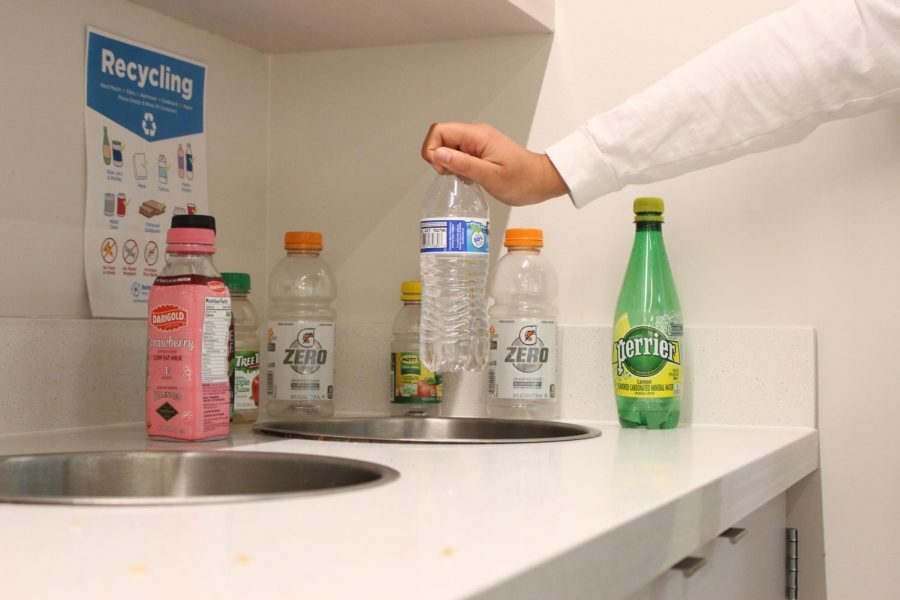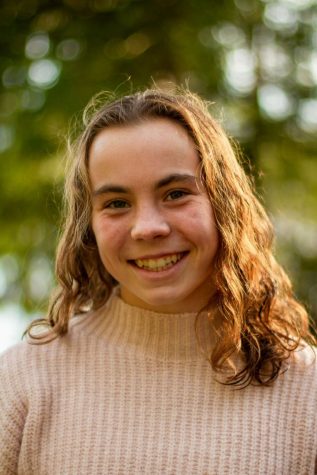Going Green
Investigating UPrep’s sustainability efforts
Photo: Abby Headstrom
Despite the discontinuation of plastic water bottle sales in the commons, students continue to use them.
Recently, the Commons Cafe discontinued their sales of plastic water bottles, causing parched lips, dry throats and hope for a more sustainable lifestyle at University Prep
According to Commons Cafe staff Karen Baber, the decision stemmed from the culmination of student pressure and the impacts of plastic on the environment. The Commons Cafe, according to Baber, has taken additional measures to help the environment. For example, using exclusively compostable plates and reusable bowls. Baber, however, believes the path to being completely environmentally friendly has many seemingly unavoidable obstacles.
 “There is a fair amount of cleaning that has to go on with dishes, requiring a lot of water and detergent,” Baber said.
“There is a fair amount of cleaning that has to go on with dishes, requiring a lot of water and detergent,” Baber said.
Baber expressed the challenges of cutting down on gas and electricity usage with the constant demand for cooked food and acknowledged to not fully knowing what to change.
“There are a lot of challenges with the way the world is now,” Baber said.
Food also largely contributes to UPrep’s waste.
According to Head of Facilities Martin Pawlina, UPrep participates in a compost exchange. UPrep gives compost to a local company and in turn receives mulch in the spring.
“We should feel bad about wasting food, but we should feel good about the fact that in the end, it comes back to our gardens,” Pawlina said.
Pawlina noted UPrep’s similarity to the sustainability of other schools UPrep’s size. Where he believes UPrep is behind is the engagement of students and faculty.
“The only thing we lack when I go to other conferences is student involvement,” Pawlina said. “UPrep [is also] lacking one person that it’s their job to be in charge of sustainability and being green.”
Junior and leader of Sierra Club Ava Anderson has mixed opinions of UPrep’s sustainability.
“I think compared to other schools, we’re doing really well because a lot of people do care,” Anderson said. “You see teachers biking to school and even students, but I think we still have a long way to go just based off our paper usage and people not realizing their effects on the environment.”
In contrast, Junior Josh Herzog believes UPrep’s level of environmental education is effective.
“[Being sustainable] expands outside of just [environmentally friendly actions],” Herzog said. “[UPrep] has community conversations, facilitators and announcements creating a lot of awareness of what’s around you and your influence. I feel like [UPrep] is just really trying to educate us.”
Anderson hopes to continue the education about sustainability within UPrep’s community.
“We want to let kids know what’s happening to the world so they can become smarter and more aware of what they’re doing in their day to day lives.”
Both Pawlina and Anderson have high hopes for more changes in UPrep’s operations. From education to student involvement and reduction of paper usage to the elimination of all plastic drinks, the two agree that it will take an all-school effort.
Both hope that the reduction of paper usage is an important next step.
“Are we ready [to go paperless]?” Pawlina said. “I don’t know. I’m sure we can but it has to be a school-wide effort.”



